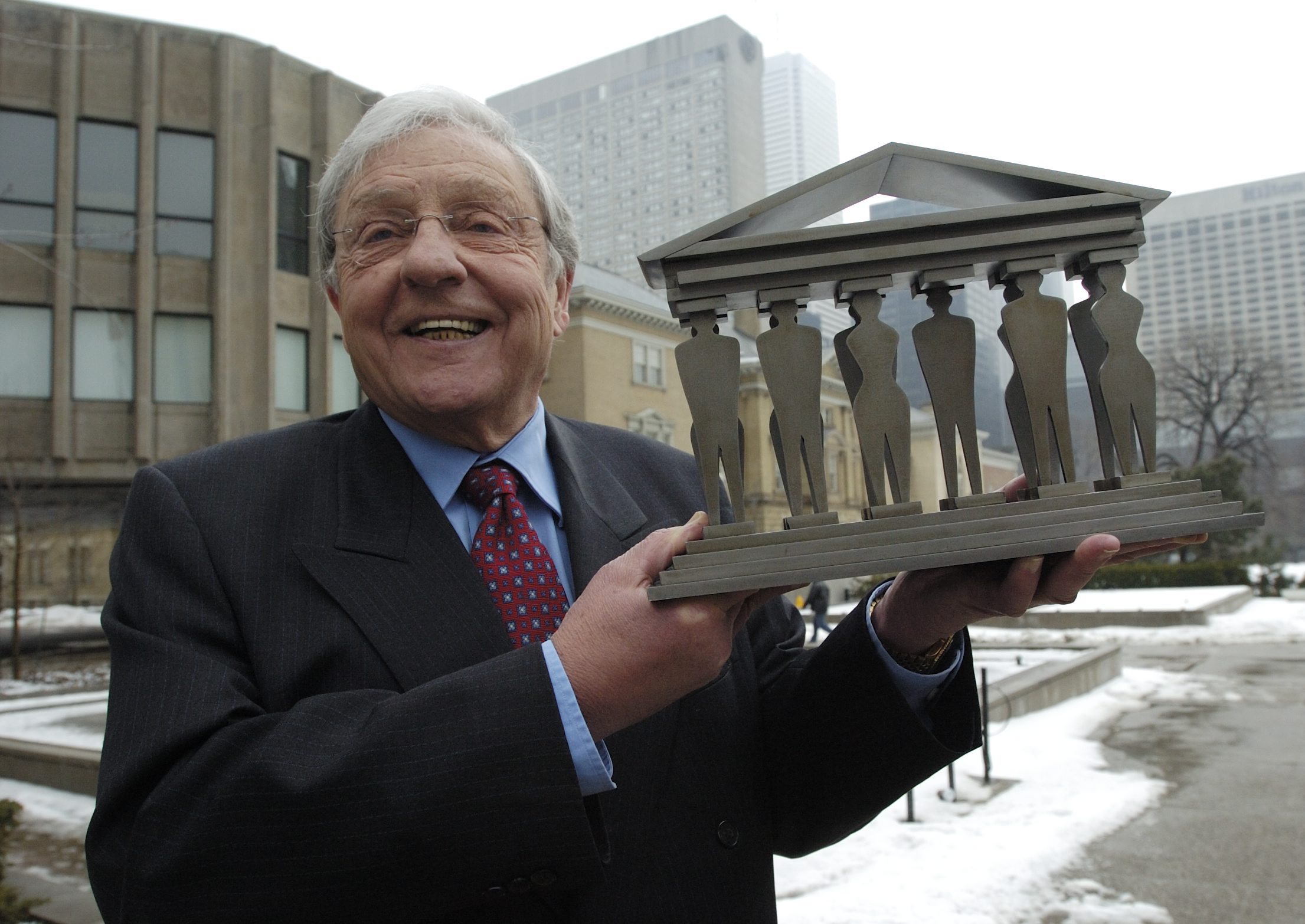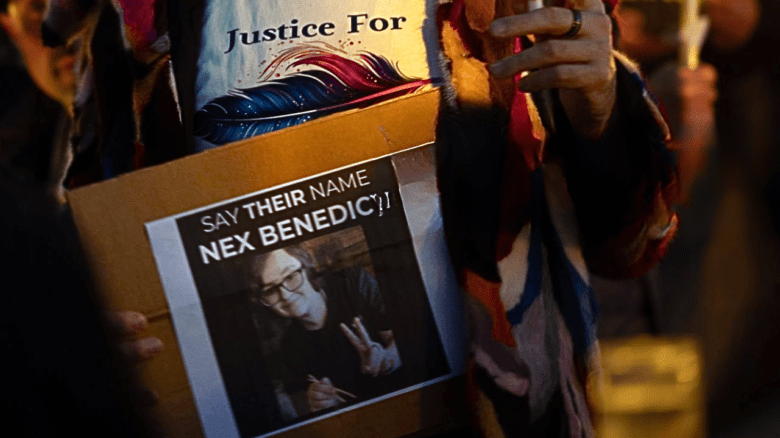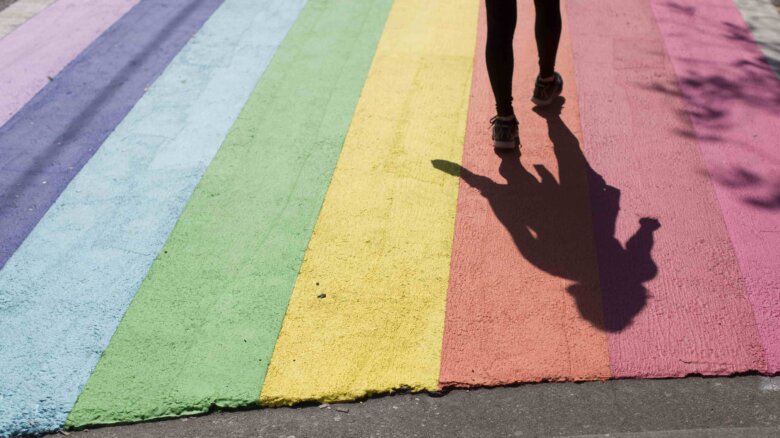Credit: Kevin Van Paassen/The Canadian Press
Editor’s Note: Roy McMurtry, 91, died March 18, 2024. The former Ontario attorney general was considered a human rights leader who was, among other things, a key figure behind legalizing same-sex marriage. This article was published in 2007. Journalist Gerald Hannon died in 2022. Portions of this article have been updated since it was originally published.
There’s a definite buzz, up here on the 33rd floor with its wraparound windows, its nonstop vistas, its darling little tables draped in gold or white cloth, each hosting a discreet candle, a tasteful single blossom, the occasional abandoned wine glass. The buzz? Variations on, “Can you believe this?”
We are gathered at Stop 33, the ballroom atop the Sutton Place hotel at Bay and Wellesley in downtown Toronto. It is 6 pm on the 11th of June, 2007. Tickets are $100 each. We are, mostly, smartly dressed gay men and lesbians. Legendary drag artist Michelle DuBarry, accompanied by the fetching bit of arm candy she calls her escort, is carrying “smartly dressed” to the point of channelling Queen Marie of Romania. A competent pianist is, as required on such occasions, being mildly irritating. Servers glide and proffer. Bob Rae, the once and future candidate, will eventually shimmer in, looking slightly lost, slightly blond and slightly grim. Tables are as likely to sport BlackBerrys as stemware. “Can you believe this?” people whisper to me and to each other.
We are collectively incredulous because of the evening’s theme: Ontario’s LGBT Communities Salute the Honourable Roy McMurtry and the McMurtry Gardens of Justice. McMurtry is Ontario’s retiring chief justice. He is 75 years old—the same age, it turns out, as Michelle DuBarry (same height, too—and my favourite moment of the evening comes when they are introduced: two lofty senior citizens, both a little awkward, one in a wig, a dress, heels and fabulous pendant cameo earrings; the other manoeuvring a scotch).
The crowd is saluting McMurtry because he was the senior member of a three-judge panel of the Ontario Court of Appeal that, on June 10, 2003, gave the thumbs up to same-sex marriage (for which he and his colleagues were named “nation builders of the year” by The Globe and Mail). He is also much admired for his commitment to minorities (he is particularly well-liked in the Black community), to pro bono work and to education. He is one of three politicians who finally brokered the deal that, in 1982, got Canada its Charter of Rights and Freedoms, a document from which gays have benefited more than any other community. As it turns out, he is also something of a machine for the production of lesbians—two of his daughters are gay (he has six children, three sons and three daughters).
What some of us here this evening can’t forget, though, is that McMurtry was, for much of our early history in this province, the most-despised politician in the legislature. The man was attorney general (AG) from 1975 to 1985 and, to the dismay of some who saw the twin portfolios as inappropriate, solicitor general as well (and therefore responsible for policing) from 1978 to 1982.
During those years we burned him in effigy. We demonstrated outside his campaign headquarters. We held an illegal sit-in in his offices—there seemed to be no other way to gain the ear of a man who seemed to us then the classic, arrogant Tory bastard with his sights set on demolishing the gay community.
Yet tonight, June 11, 2007, a room full of gay men and lesbians is giving the man a standing ovation. As one of the guests whispers to me, “Somebody has some ‘splainin’ to do.” Moments before, lawyer Doug Elliott, one of the organizers along with community activist Michelle Douglas, has called the event an evening “of truth and reconciliation.” Reconciliation is undoubtedly in the air. I was hoping, though, for a little truth.
That hope goes back a long way. Very late on the night of Feb. 5, 1981 (or perhaps very early on the morning of Feb. 6), I tried to get McMurtry out of bed. I had his home telephone number and the home telephone numbers of all members of the Ontario Cabinet. The list had been mailed to The Body Politic, the now-defunct gay periodical where I then worked (and which would later birth the Xtra papers), in the classic plain, brown envelope. We never knew who sent it, or why.
I had just returned to the paper’s Toronto offices in a blind rage, having witnessed firsthand the police descent on four of the city’s bathhouses and the arrest of hundreds of men. I wanted an explanation from the solicitor general, but mostly I think I wanted someone to yell at. I dialled. A woman answered the phone (neither McMurtry nor his wife, Ria, says they remember this incident), listened to me bellow, probably not very coherently, about absolutely having to speak to Mr. McMurtry. She asked who was calling, told me to wait a moment, put down the phone and never came back. I eventually hung up. There may have been a light on at the McMurtrys, but there was no one home. Not, at least, to us.
By then, we were used to not being listened to. McMurtry’s 10 years as AG coincide with what in retrospect could be called the get-the-gays decade. It’s difficult to explain to anyone under 30 the emotional impact of living through those years of raids, arrests and crackdowns, partly because, though it was a turbulent time, it was not always a terrible time. The media might see you as an unsavoury curiosity, the bars you patronized often treated you with contempt, you might see your friends arrested or queer-bashed and you might even fear for your job—but you also felt swept up in an unstoppable social movement, dancing your life along the fault line opening up between that grisly old world and a new dispensation you could sense and almost grasp. But it took ardour and brains and energy to hold onto that vision. Sometimes, you lost it. In March 1975, 18 Ottawa men were arrested in what the papers called a “sex scandal.” One of them committed suicide. Moments like that were not rare.
Under the circumstances, one might be forgiven for suspecting that an anti-gay animus was operating at the highest levels of government and the police. That is why it was so surprising to read a Globe and Mail article of Apr. 4 asserting that, over his 40-year career, “nothing stung Chief Justice of Ontario Roy McMurtry quite as much as being labelled a homophobe.” The man is quoted as saying, in reference to the 1981 Toronto bath raids, “the irony of the whole thing was that I had expressed my concern to the chief of police; that it really looked like we were dissolving into a police state. The whole thing looked terrible.”
It was odd to hear him refer back to those days—he had slipped off our radar for a long time after he left the AG’s office. He was high commissioner to Britain from 1985 to 1988, a partner in a law firm from 1988 to 1991, then a judge at different levels of the court system until his appointment as chief justice on Feb. 20, 1996. If we thought of McMurtry at all after 1985, we would no doubt have continued to pigeonhole him as the big blue Tory meanie of the get-the-gays decade. Elliott recalls the reaction of Brent Hawkes, the Metropolitan Community Church minister best known for his role in the fight for marriage rights, when McMurtry’s name led the list of judges who would hear the Halpern case (deciding on the validity of same-sex marriage). “He might have felt that Satan himself would be sitting on the panel,” recalls Elliott. “But I said, ‘No. Those were the bad old days.’ “
I want to talk with McMurtry about the bad old days. We meet at 11 one morning in what was then his office in Osgoode Hall (he reached compulsory retirement age at the end of May). There is nothing intimidating about the man—he has something of a good ol’ boy languor in his manner (helped along, perhaps, if my usually reliable nose is correct, by the rum and coke he nurses throughout the interview). He’s tall, over six feet, though a little stooped these days, and was a real hottie as a young man—in a photograph from his football days at U of T in the ’50s, he’s clean cut, sleepy-eyed and eminently kissable. Today the face is large, friendly, florid and somehow vaguely disorganized, like a peony gone past its prime. Before we sit down to chat, he hands me the text of a speech he made in June 2005 to the International Lesbian and Gay Law Association Third Triennial World Conference, and asks me to read it for context. It’s a kind of apologia pro vita sua, noting that “while many good things happened in government during my years as attorney general, in retrospect I am still embarrassed by the government’s inaction with respect to issues related to discrimination against gays and lesbians.”
A distaste for discrimination and a commitment to civil liberties and progressive social legislation does seem to be a family trait. When I talk to Roy’s brother John, a leftist professor emeritus at University of Guelph, he tells me how their father, trial lawyer Roland Roy McMurtry, refused to accept a room at the Château Laurier in Ottawa because the hotel would not rent a room to his Black travelling companion. John, who is heterosexual, also describes same-sex marriage as “the big vote for state control of love. What the hell are you mimicking straights for?” Roy’s son, Jim, a teacher in B.C., ran in the last federal election as a Liberal and lost, perhaps partly because of his public support for same-sex marriage.
For his part, Roy was involved in the fight to stop the Spadina Expressway in Toronto in the late ’60s and early ’70s and opposed then-prime minister Pierre Trudeau’s implementation of the War Measures Act in 1970. He opposed capital punishment, brought in the Family Law Reform Act (giving women an equal share in family property), introduced seat-belt legislation, established bilingual courts, greatly increased the number of legal aid clinics when he was AG, and tried to discourage hockey violence by initiating prosecutions of players. He worked, as high commissioner to Great Britain, to help free Nelson Mandela and helped found Pro Bono Law Ontario in 2002. He leads Toronto mayor David Miller’s advisory panel on community safety (where he was described as a “real dude” by a 25-year-old youth worker on the panel).
Michael Tulloch, an Ontario Superior Court judge and past president of the Canadian Association of Black Lawyers (CABL), tells me of McMurtry’s contribution as a patron of the Second Chance Scholarship Foundation, an organization providing scholarships “to young persons who are, or have been, involved in the criminal justice system or disadvantaged youth who are at-risk for becoming involved in the criminal justice system.” Frank Walwyn, the current president of CABL, comments in an email that “the stories passed down to me from trailblazers in the Black legal community, both young and old, all speak to a man who opened his door to anyone who had a problem and who was generous to an extreme with his time and wisdom as to how to solve those problems.”
Impressive credentials, though his history does feature a few less stellar pages. Lawyer Paul Copeland, who much admires McMurtry’s work today, has no problem remembering the man’s refusal to prosecute certain RCMP officers whose dirty tricks, he said back in 1982, “strike at the root of freedom of assembly.” Even his most ardent gay fans still have some lingering resentments. Elliott, the lawyer involved in many high-profile social justice cases concerning the gay community, speaks of how his own early misconception of what constituted the roles of AG and solicitor general led him to blame McMurtry for the bath raids.
“I know now that’s not how the police operate,” he says. “They don’t take orders from the AG. They might consult with lower- order officials, but in those days there was very little consultation and both police management and the rank-and-file were very homophobic. McMurtry has said many times point-blank that he neither knew of the raids nor approved them, and I believe him. In fact I can say that if he had been consulted, he wouldn’t have approved.”
Elliott does go on to say, though, that there are things for which he still faults McMurtry. “He was the person leading law reform in the [former Ontario premier Bill] Davis government. He was a Red Tory and not afraid to stir the pot on a number of fronts, but when it came to gay rights he turned a deaf ear. There were recommendations from the Ontario Human Rights Commission and his government did nothing. He could have called a public inquiry into the bath raids and he didn’t. That was totally on his desk and he chose not to do it.”
And what does McMurtry say? I get a hint from a few remarkable passages in the speech he gives me to read before we speak. Referring to his government’s inaction, he wrote “the simple and regrettable fact was that the issue [of gay rights] was not on the political radar screen to the extent that it deserved.” Earlier in the speech he wrote, “during my 10 years in the Ontario Legislature, issues related to discrimination on the basis of sexual orientation were in my memory rarely if ever debated. Indeed, I do not recall a single question asked of the government in those years in relation to amending the Human Rights Code.”
There is a willful blindness at work here. We know the man was not pestered in the legislature by an opposition indignant at the slow process of extending rights to gay people, but McMurtry understands that a parliament is far from the only venue for democratic action. The first gay demonstration at Queen’s Park to demand a change in the Ontario Human Rights Code happened way back in June 1972; the next decade was a seemingly endless series of demonstrations, petitions and lobbying; Toronto City Council banned discrimination on the basis of sexual orientation in municipal hiring in 1973; 1975 saw the brutal firing of racing steward John Damien “because he is a homosexual;” the Ontario Human Rights Code Review Committee called in 1977 for the inclusion of sexual orientation in the Code—and we are to believe that none of this registered with the AG because none of it led to properly sanctioned debate on the floor of the legislature?
The truth is, you didn’t have to be a homophobe in those days to make the decisions McMurtry made. You had only to be an astute politician and, as former Body Politic collective member Tim McCaskell puts it, a bit of an opportunist. Supporting gay rights would have been what today is called a career-limiting move. McMurtry, at the “red” end of his own party, could expect no support from his more conservative colleagues. The police saw gay people as criminals waiting to happen—why alienate the very group that, as solicitor general, he was expected to lead and inspire? Even the NDP paid little more than lip service to gay community demands. As lawyer Clayton Ruby (who defended The Body Politic and its corporate officers throughout its endless series of trials) noted in a 1982 Toronto Life magazine profile of McMurtry, “polls show that every time politicians bash around the gay community, it does wonders for them with the voters. If 10 years from now that became a political liability, I think McMurtry would change completely.”
McMurtry is similarly disingenuous throughout most of our conversation. Why, I ask, did you prosecute the hundreds of men charged as found-ins in the bath raids? “No one,” he says, “suggested otherwise to me or gave me any legal basis for not prosecuting. Lawyers for the found-ins might have done that—but the attorney general doesn’t get involved with prosecutions unless presented with a solid legal basis, and no one did that. If a single lawyer had written to me to protest what occurred.”
Ruby thinks otherwise. “McMurtry enthusiastically supported the bath raids prosecutions,” he says. “He didn’t tell his employees not to prosecute—there was room for him to make that decision and he didn’t. I don’t think he initiated the raids, but he prosecuted and it was horrible and mean and nasty for a lot of people.” Ruby adds, “In those days, even among Red Tories, there wasn’t much sensitivity on gay issues. He’s changed, and not many of us change. He’s turned into a Red Tory saint, has done wonderful stuff, especially among poor blacks and native peoples. He’s tough-minded, and as radical as you can get.”
On the question of why he never called an inquiry into police/gay community relations in the wake of the bath raids, McMurtry has this to say: “No one asked me. No one made a formal request.” I’ve no idea what a formal request might look like, but I have before me a copy of a letter dated Feb. 12, 1981, from McMurtry to Canadian Civil Liberties Association counsel Alan Borovoy, in which he answers Borovoy’s suggestion that there “should be some form of independent enquiry” with, “We are not aware of any information at this time that would warrant a public enquiry.”
Then there is the Body Politic case. On Dec. 30, 1977, police raided the paper’s offices, responding to media-generated hysteria over an article I’d written called “Men Loving Boys Loving Men.” The article took a sympathetic look at relationships across the age divide and featured interviews with several adult men who were romantically and sexually involved with boys or youth.
It is hard to know what to make of this man. I know that good people can do bad things. I know that social pressure, class pressure, political pressure can lead you to act against your finer instincts and handily provide you with the rationale you need to justify it. I know that opportunism, especially in politics, often just seems to make sense. I know that most people, including many gay people (including me, way back when), were homophobic. I don’t hold that against them. It was just the way of the world. There was no reason to think otherwise.
But McMurtry says, not very believably, that he was never homophobic, that “this would be a better story if there had been a transition, but there wasn’t. When I was growing up I knew some young men who were clearly gay and though it was never a subject of conversation it wasn’t an issue either.” He was close friends with the late Ian Scott, the closeted homosexual who was AG for the Ontario Liberal government of David Peterson, and the late Arthur Maloney, the closeted homosexual who was the province’s first ombudsman. Elliott speculates that, for McMurtry, gay life meant “living in the closet, that as long as you were discreet it was okay. I don’t think he had any insight into how horrible the closet can be. Roy McMurtry was never a homophobe, but in those days I don’t think he got it either.”
If he gets it today, his family life surely had some impact. His two gay daughters were in their mid- to late-teens at the time of the bath raids. Jeannie, who never returned my phone calls, is now 44, in a relationship with a woman and raising a small child; Erin, now 42 and an actress, has never been in a long-term relationship, though did have a fling with Rough Trade’s Carole Pope. It’s not clear when the two came out to their family, but the process was, by all accounts, not a painful one. Roy says that the event “didn’t change the family dynamics at all, and though there were many conversations, the bottom line is that they never thought they’d have to convert me to a different way of thinking.”
Erin, who, when asked, describes herself as a seven or eight on the lipstick-lesbian scale, says, “It’s all very simple. I never saw my dad as a homophobe, and I never heard him say anything bad about gay people, ever. The bath raids didn’t really register on me at the time—I wasn’t a gay man—but I do remember Dad being worried that there had been bad treatment of the found-ins by the police.” Her brother Jim, now 48, feels that the coming out process “made my father closer to them; made him feel that maybe they needed him more. There was certainly no sense of stain in the family. There was a little awkwardness at first, but that quickly evolved into mirth—earlier we’d all have been making jokes about how Jeannie always seemed to be out looking for the right man…. I know my sisters worried about telling them, but there was no need to. And one thing my parents never said was, ‘Are you sure?'”
Howard Morton is a defence lawyer in private practice today, but during much of the get-the-gays decade he was director of the Crown Law Office, Criminal (in charge of appeals in criminal cases and reporting to McMurtry). He prosecuted some of the bath raids cases and has a most refreshingly up-front take on government and police motives from that era. “We were all homophobic,” he says. “Oh, people will deny it now, but I could tell you the jokes that used to make the rounds…. Most heterosexual men were homophobic in those days and that’s that. With The Body Politic case—our office did all the appeals and I think it was probably just reflective of our general homophobic state of mind.”
I ask him if he felt the police were out of control in those days. “Well,” he says, “if 70 percent of the rest of us were homophobic, then the police would have been more like 85 percent. The police did not consult with us about the bath raids. If ever there was a criminal investigation likely to become a real public issue, they were inclined to come to the Crown law office for advice, and they didn’t.” And his boss, Roy McMurtry? “He was representative of the mindset that existed at the time, but if you change homophobic to antigay, he certainly wasn’t that—though there were some in the ministry who were. He was just more reflective of public opinion in those days, and back then weren’t we all a bit homophobic? It took AIDS to turn me around, to make me look at the issue anew, as a human rights issue.
“I think Roy was less anti-gay than any of us. Also, when you’re the chief law officer of the Crown, you don’t have much room to let your personal views affect what you do. You don’t have that luxury. Your role is to enforce the law. But believe me, if Roy McMurtry hadn’t been Attorney General, you would have seen a much greater homophobic push coming from the ministry. If anything he was a tempering force.”
I want to close with a little story McMurtry told me, one which I think reveals rather more than he thought it did. “When I was attorney general,” he said, “my driver was gay. He was practically a member of the family. He was an usher at my son’s wedding and spent weekends with us at the cottage. He got himself into a bit of trouble—I was opposed to the police snooping around in washrooms but… the cops came to me about him. I told them, I’m not going to tell you what to do, but you should know that he is a fine man.’ The whole thing never went any further. It happened again years later when I was in Britain, and this time he was charged, but I wrote a good character letter on his behalf and filed it with the court.”
He didn’t seem to realize that he was telling me that he did for a family friend a version of what he could have done, should have done for the hundreds of men arrested in the bath raids for an offence no less trivial than a bit of washroom hanky panky. He didn’t seem to realize that he was telling me that he didn’t actually need a “formal request” to take action and to make a difference. He was telling me that the police had discretion when it came to enforcing the law, and so did he. He was telling me that justice isn’t blind—that justice often looks out for its own. I guess he was also telling me that he wasn’t homophobic. I’ll accept that. I believe him. If only, back then, it had made a difference.

 Why you can trust Xtra
Why you can trust Xtra


